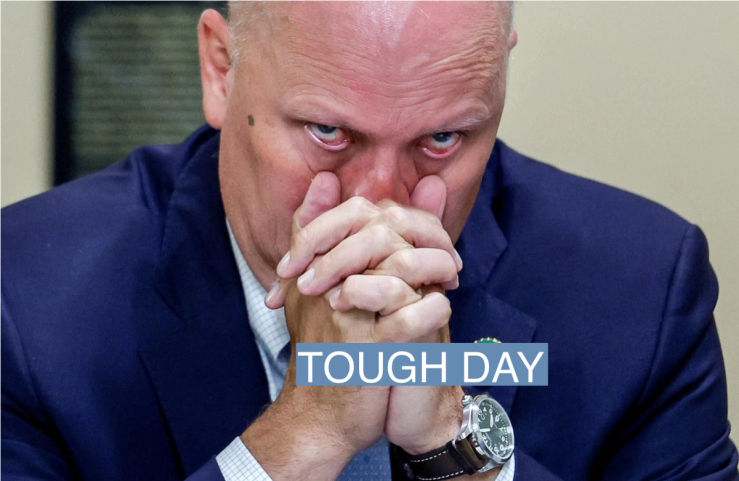The News
Hard-right Republicans spent much of Tuesday furiously denouncing Washington’s new debt ceiling deal as it began moving through Congress, promising to use any means within their reach to derail it.
But by the evening, even some of the bill’s loudest opponents had begun to admit what seemed increasingly obvious: The package looked well on its way to becoming law.
Colorado Rep. Ken Buck, a member of the arch-conservative House Freedom Caucus, raised a white flag on CNN, even as he promised to vote no on the deal. “This bill will pass,” he said. “Some Republicans will vote for it. Some Democrats will vote for it. It will go to the Senate. It will pass in the Senate. It’ll be signed by the president and the United States will not default.”
South Carolina Rep. Ralph Norman, another no-vote, also told a reporter that passage appeared all-but guaranteed; he’d heard that 100 House Democrats had decided to back the bill, almost certainly enough to put it over the top.
It was a quick comedown from earlier in the day, when Freedom Caucus members gathered for a 45-minute press conference to rail against the package. Members criticized it as a tepid compromise that failed to cut spending enough in return for raising the government’s borrowing limit, and accused House Speaker Kevin McCarthy of failing to deliver the deal he promised to his party.
“The Republican conference right now has been torn asunder and we are working hard trying to put it back together again by making sure that this bill gets stopped,” Texas Rep. Chip Roy told reporters.
But conservative hopes of tripping up the deal seemed to fade after it cleared its first key procedural hurdle before the House Rules Committee, which voted 7-6 to send the bill to the floor for debate Wednesday. Freedom Caucus members had suggested they might be able to bottle up the bill before the panel. But the legislation earned a key vote from Rep. Thomas Massie of Kentucky, a libertarian-leaning conservative who had kept mum on his position through the day.
“I’ve been in Congress for a decade and this is the first real bill that cuts spending,” Massie explained later as he announced his support for the deal.
At least 30 House Republicans were poised to oppose the debt ceiling bill as of Wednesday morning. However, the roster is mostly made up of names that senior Republicans never expected to vote for anything less than the party-line bill they originally passed through the House.
“These were not likely ‘yes’ votes at the beginning of last week,” Rep. Dusty Johnson of South Dakota said. “We shouldn’t be all that surprised they’re not ‘yes’ votes at the beginning of this week.”
In this article:
Joseph’s view
The suspense is quickly draining from the debt ceiling standoff. But it’s still an open question whether any frustrated conservatives may try to oust McCarthy over the deal.
North Carolina Rep. Dan Bishop, another Freedom Caucus member, became the first Republican to threaten to try and topple the speaker on Tuesday. “It is inescapable to me. It has to be done,” he told Politico. Meanwhile, Rep. Matt Gaetz of Florida suggested McCarthy may face a referendum on his leadership if he allows the bill to pass without support from the majority of House Republicans.
McCarthy could in theory be vulnerable to a challenge, since the rules package he agreed to in order to become speaker allows any single member to call a snap no-confidence vote against him — known as a “motion to vacate.”
However, the speaker told reporters Tuesday he wasn’t worried about a mutiny — “That’s his choice,” he said when asked about Bishop’s threat — and other hardline conservatives downplayed the chance of an outright rebellion that throws the GOP into chaos.
“The motion to vacate talk is not serious,” Rep. Marjorie Taylor Greene of Georgia said. “It would be a horrible decision.”
Greene, for her part, referred to the debt ceiling deal as a “shit sandwich” multiple times, but said she was still leaning toward supporting it. She suggested that if leadership promised to impeach an administration official, it would help secure her vote, saying the idea would be a “great dessert.”
Room for Disagreement
It’s still possible we could still see some last-minute snags in this process, in part because some Senate Republicans made it clear they’d seek amendment votes in exchange for any agreement to fast-track the debt limit bill through the Senate. Sen. Rand Paul of Kentucky said he’d seek a vote on his so-called “five-penny” plan to balance the federal budget within five years. “No amendments, we’ll be here until next Tuesday,” Paul told reporters.
Kadia Goba contributed reporting.


